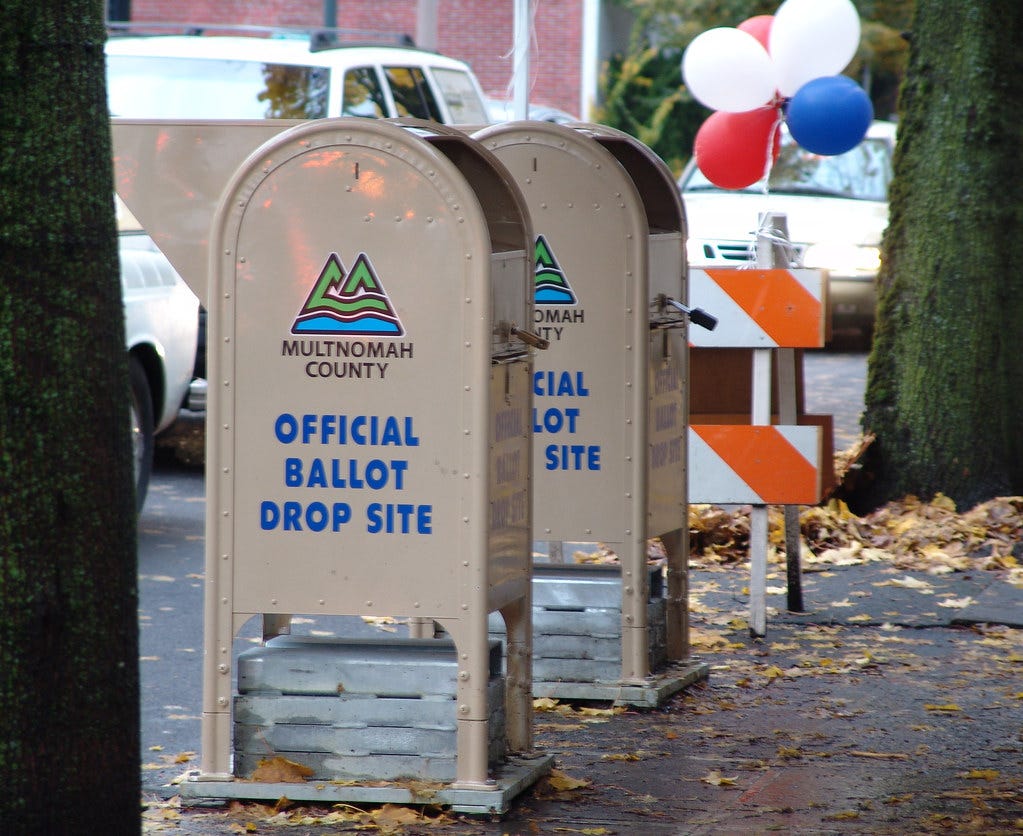Rob Harris: Strange Bedfellows can Reform Our Elections
This feels like a time when major structural changes to our election architecture is possible.
Rob is managing partner of Harris Velazquez Gibbens, Attorneys, a litigation law firm.

I believe most Oregon voters would like a state government that more fully represents everyone and focuses on solving our difficult problems with reasoned and honorable negotiation and principled compromise. Instead, we have a growing urban/rural political divide, increasing hyper partisanship, rising interpersonal animosity, and, in many cases, deepening fears of physical confrontation.
How do we reverse this path?
Pleading for less partisanship and more compromise or hoping that political professionals unilaterally disarm won’t fix what’s wrong. Hyper and negative partisanship are effective election strategies. Political professionals use divisive tactics because their primary job is to win elections, not to preserve democratic norms.
In a hyper partisan environment, candidates may listen to the consultant on their shoulder and engage in behaviors they would otherwise find “wrong.” Ethical norms can be compromised when losing an election is perceived as a greater loss than sacrificing political morals by, for example, running misleading negative attack ads.
Since human behavior is largely immutable, if we want a change the tenor and tone of our elections then our election choice architecture must change to one that incentivizes democratically normal behaviors. We need an architecture that rewards candidates who center their campaigns on understanding their community (not their consultants), principled leadership (not polling information), and a willingness to partner and work with others (rather than secretly working within their own ideological bent).
To evaluate what process changes should be made, it helps to understand some reasons why and how hyper partisanship and negative partisanship have come to dominate politics. I believe these are the major factors:
Recent advances in behavioral psychology as applied to politics have found that negative ads sowing fear and anger are twice as effective as ads and messages of hope. The same dollar on negative messaging has twice the value as that spent on positive messaging. If you werea campaign manager, how would you spend your ad budget knowing this difffernce?
Technology now allows political campaigns to reach voters at a granular level and feed them tailored messages, often laden with negativity and partisan triggers.
Elections may be only months long, but the political-entertainment business now makes pre-election hype a 365-days-a-year business making almost every issue seemingly partisan and compromise a sell out.
First-Past-the-Post voting and the desire of donors to back the most likely winners means only the Democratic and Republican nominees are viable candidates in the general election. If your donation is an “investment,” then investing in a third party candidate seems unlikely to yield a return.
Moderate voters who left the Democratic or Republican Parties can’t participate in Oregon’s closed primaries, leaving the selection of the two November finalists to the more partisan voters.
General elections don’t even matter in 90% of our Legislative races because of legally- and self-gerrymandered districts that are solidly blue or red. Our poorly drawn lines mean that elections are effectively decided in those ever more partisan and single-issue-interest-dominated closed primaries.
Because of Oregon’s lack of robust campaign finance laws, the barriers for viable non Democratic and Republican candidates are impossibly high.
Especially in Oregon’s deep blue and deep red districts, candidates that most effectively use hyper-partisanship continue to win. This creates a feedback loop. As the more partisan are rewarded in safe districts the only threat to incumbents comes from the fringe of their own party by way of a primary challenge. Repeat.

Some solutions to mitigate partisanship are being worked on today. Oregon voters approved setting limits on campaign contribution limits. Though the Legislature has yet to do so. Representative Dan Rayfield has led the way on exploring the use of ranked choice voting, and Oregon entrepreneur Mark Frohnmayer has developed and advocated for STAR voting, another unique and representative voting option. A group called Oregon Open Primaries is working on assuring all Oregon voters can participate in our May primary election.
More aggressive ideas include adopting multi member districts so a moderate Republican or Progressive Party candidate from Portland, or an Independent from Washington County, or a moderate Democratic rancher from eastern Oregon would have a chance to win one of the multiple district seats and represent their local community. Learn more about this idea in Rich Vial’s post here.
Changing the way we vote and perhaps even how our State houses are configured may at first seem like pretty radical ideas.
But is making our system more representative actually that radical?
Is it radical to take into account modern technology and our better understanding of human behavior? Frankly, it’s more radical to refuse to make systemic changes when conditions and knowledge change.
Many past reform movements were centered on a specific ideological frame or a set of specific policy goals and therefore appeared, or were made to look, partisan. But improving our election process is not partisan. What’s more, it is wildly popular among the wide spectrum of voters.
This feels like a time when major structural changes are possible. To realize these changes, all the disparate reform groups in Oregon will need to join and agree on the path forward. In addition, recruiting a moderate donor base to fund the movement is necessary for success.
This may seem like an odd alliance at first, but together there is much common ground on creating a new election architecture centered on the American democratic ideals of honest elections, fair representation, civil debate, partnership, and principled compromise.
********************************
Send feedback to Rob:
@ORobHarris
Keep the conversation going:
Facebook (facebook.com/oregonway)
Twitter (@the_oregon_way)
Check out our podcast:



